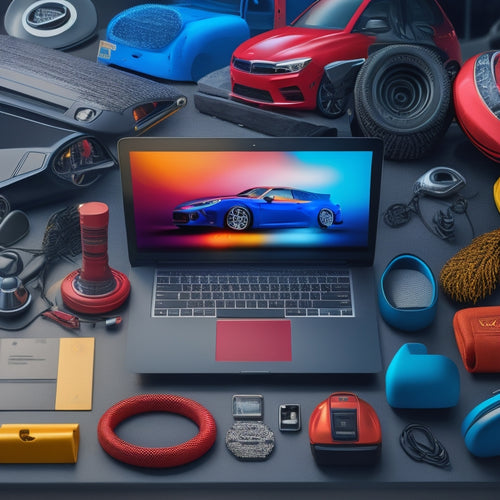
5 Best Car Rebates for Low-Income Families
Share
You can access a range of rebates and incentives that make electric vehicles (EVs) more affordable, with up to $7,500 in federal tax credits and additional state-specific rebates available for low-income families. You can also explore discounts from utility companies, non-profits, and manufacturers designed to make EVs accessible. State initiatives like California's CARB Clean Vehicle Rebate Project and Colorado's rebates up to $5,000 can be combined with federal incentives. Discover more about these opportunities and how you can take advantage of them to get behind the wheel of an EV.
Key Takeaways
• Federal incentives offer up to $7,500 tax credit for qualifying EV purchases, with larger credits for low-income families.
• State-specific rebates, like California's CARB Clean Vehicle Rebate Project, provide additional savings for low-income families.
• Utility companies offer exclusive discounts for EV buyers, helping low-income families save on energy bills.
• Non-profit organizations, like local charities, offer rebates and incentives to make eco-friendly transportation accessible to all.
• Manufacturers provide discounts for low-income families, with programs designed for underserved communities and rebates or tax credits in some states.
Federal Incentives for EV Buyers
You can receive a federal tax credit of up to $7,500 when you purchase a qualifying electric vehicle (EV), helping to offset the higher upfront cost of eco-friendly cars. This tax credit is a significant incentive for low-income families to contemplate switching to an EV.
The credit is available for the purchase of new EVs, and the amount you're eligible for depends on the vehicle's battery size and gross vehicle weight rating.
Additionally, the Infrastructure Investment and Jobs Act has allocated funds to support the development of a thorough network of EV charging stations across the country. This investment will make it easier for you to own and maintain an EV, with access to convenient and reliable charging infrastructure.
State-Specific Low-Income Rebates
Several states offer additional rebates and incentives specifically designed for low-income families, providing even more financial assistance to those who need it most. As you explore your options, you'll find that some states have implemented regional initiatives to support low-income families in their move to electric vehicles.
For instance, California offers the California Air Resources Board's (CARB) Clean Vehicle Rebate Project, which provides up to $5,000 in assistance to eligible low-income families. This program is specifically designed to help you afford a cleaner, more environmentally friendly vehicle.
Other states, like Colorado, offer similar programs, providing rebates of up to $5,000 for low-income families purchasing electric vehicles. These state-specific initiatives can be combined with federal incentives, further reducing the cost of purchasing an EV.
It's important to research the programs available in your state, as they can greatly impact your ability to afford a new vehicle. By taking advantage of these regional initiatives, you can drive away in a new electric vehicle, knowing you've made a smart financial decision for your family.
Utility Company Discounts Available
In addition to government incentives, many utility companies offer exclusive discounts to their customers who purchase electric vehicles, further reducing the overall cost of EV ownership. You can benefit from these discounts, especially if you're a low-income family, as they can help you save money on your energy bills.
Many utility companies offer Energy Assistance programs, which provide discounted rates to eligible customers. For instance, some companies offer a 10-20% discount on electricity rates for low-income households. These discounts can be especially helpful for families who struggle to pay their energy bills.
To take advantage of these discounts, you'll typically need to provide proof of income and participate in a qualifying program, such as the Low-Income Home Energy Assistance Program (LIHEAP). Some utility companies also offer special rates for electric vehicle owners, which can help you save even more on your energy costs.
Be sure to check with your utility company to see what discounts and programs are available to you. By taking advantage of these offers, you can enjoy the benefits of EV ownership while keeping your energy costs low.
Non-Profit Organization Offers
Beyond government incentives and utility company discounts, non-profit organizations also step in to offer rebates and incentives to low-income families looking to purchase electric vehicles. As you explore your options, you may find that non-profit organizations can provide valuable financial assistance to help you get behind the wheel of an eco-friendly ride.
For instance, some non-profits offer vehicle donations, which can greatly reduce the upfront cost of purchasing an electric vehicle. Additionally, some organizations provide financial assistance in the form of grants or loans, which can help you cover the costs associated with buying and owning an electric vehicle.
These organizations understand the importance of making eco-friendly transportation accessible to all, regardless of income level. By taking advantage of these non-profit offers, you can enjoy the benefits of electric vehicle ownership while staying within your budget. Be sure to research and reach out to organizations in your area to learn more about the resources available to you.
Manufacturer Discounts for Needy
To guarantee, it's crucial to
You can also explore discounts offered directly by manufacturers, which often have programs in place to make their electric vehicles more accessible to low-income families. These programs can provide significant savings, and sometimes, they're specifically designed for low-income households.
For instance, some manufacturers offer discounted rates for families living in underserved communities or those participating in community outreach programs. Additionally, some states offer special incentives for low-income families, such as rebates or tax credits, when purchasing an electric vehicle.
To take advantage of these discounts, you'll need to check the manufacturer's website or visit a local dealership to inquire about their programs. You may be required to provide proof of income or residency to establish discount eligibility.
Some manufacturers also partner with non-profit organizations to offer special discounts, so it's crucial to research these partnerships as well. By exploring these options, you can find an affordable electric vehicle that meets your needs and budget.
Remember to also factor in other costs, such as charging and maintenance, to guarantee you're getting the best deal possible.
Frequently Asked Questions
Can I Combine Federal and State Incentives for a Bigger Rebate?
You can potentially combine federal and state incentives for a bigger rebate through incentive stacking, maximizing your rebate. Research the specific programs you're eligible for to determine if you can stack rebates for the best deal.
Do I Need to Prove My Income to Receive a Low-Income Rebate?
When applying for a low-income rebate, you'll likely need to provide income verification, such as tax returns or pay stubs, to meet the proof requirements, so be prepared to share financial documents to qualify.
Are Rebates Available for Used or Refurbished Electric Vehicles?
Did you know that 70% of Americans are open to purchasing an electric vehicle? You're in luck! Yes, rebates are available for certified pre-owned or refurbished electric vehicles that meet certification programs, ensuring battery longevity and performance.
Can I Get a Rebate if I'm Not the Registered Owner of the Vehicle?
If you're not the registered owner, you might still qualify for a rebate as a co-owner or lessee, but leasing options and benefits vary by program, so research the specific requirements that apply to your situation.
How Long Does It Take to Receive the Rebate After Applying?
"After submitting your application, you'll typically wait 6-8 weeks to receive your rebate, but be prepared for potential processing delays. The application timeline can vary, so be patient and plan accordingly to avoid any financial strain."
Related Posts
-

Top 10 Tips for Buying Car Accessories Online
When purchasing car accessories online, you should take proactive steps to avoid low-quality or incompatible products...
-

Why Electric Motorcycles Fail at Long-Distance Touring
You're likely familiar with the excitement of hitting the open road on an electric motorcycle, but you're also smart ...
-

Planning for an Electric Vehicle-Friendly Urban Future
As you plan for an electric vehicle-friendly urban future, you'll need to integrate high-power charging stations, sma...


